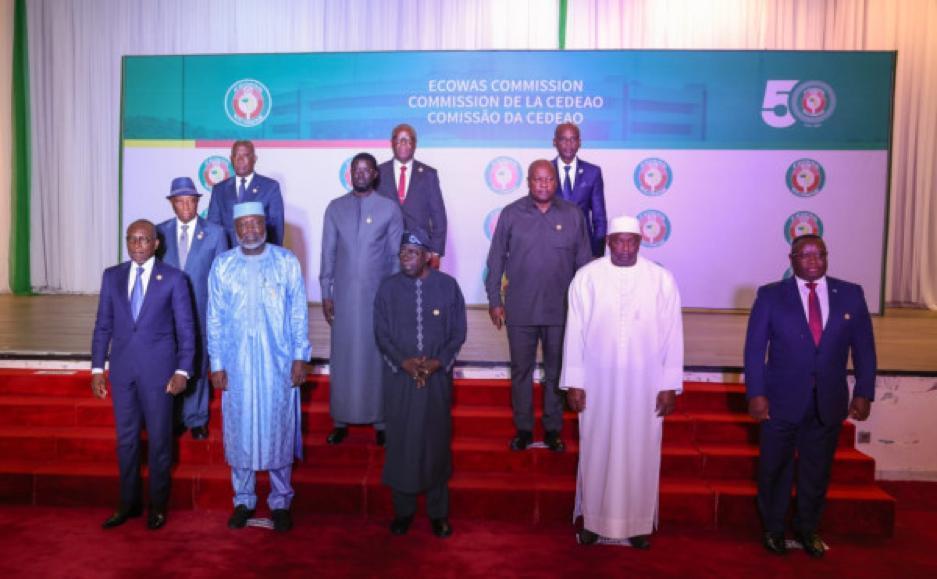Africa-Press – Gambia. The Edward Francis Small Centre for Rights and Justice hereby expresses its deep concern at the outcome of the 67th ordinary session of Ecowas leaders held on 22 June 2025 in Abuja, Nigeria. After reviewing the final communique of the session, we are concerned that pertinent issues affecting the subregion were either not addressed at all or not fully addressed. At a time when three of the bloc’s members – Burkina Faso, Mali, and Guinea – have vacated, whom together with Niger remain under military rule puts the subregion in an unprecedented situation that called for urgent decisions. Coupled with the increasing democratic backsliding across West Africa amidst dire socioeconomic conditions and corruption, with severe global geopolitics looming over the bloc, we are of the view that the august gathering has not responded adequately to the state of affairs in the subregion.
In the first place, we are shocked that Ecowas leaders did not mention the travel ban imposed by the Trump regime which affects 13 of the 15 member states. These are Sierra Leone, Togo, Liberia, Nigeria, Benin, Burkina Faso, Cape Verde, Gambia, Ghana, Côte d’Ivoire, Liberia, Niger and Senegal. Not only is the US decision a violation of international law and human rights it is also discriminatory and unethical which needed a response from ECOWAS. The Trump decision severely disadvantages and punishes West Africans at home and in the US without justification for which ECOWAS leaders should address.
On democracy, peace and security, the communiqué states, “The Authority notes with satisfaction the continued adherence of Member States to Community values and principles on Democracy, Good Governance, and Dialogue, as demonstrated by the continuous conduct of inclusive, peaceful and credible constitutional, electoral and dialogue processes.”
This statement contradicts the situation on the ground across the Community where there is increasing democratic backsliding in several, if not all member states. Apart from issues raised about Guinea-Bissau, Togo, and Côte d’Ivoire, we note with grave concern the widespread incidence of abuse of power, disregard of the rule of law and corruption in member states. From Nigeria to The Gambia, the incidence of blatant disregard of national laws, violation of human rights, and abuse of office remain prevalent in member states. It is therefore hugely worrying when Ecowas leaders claim satisfaction at the state of democracy in member states.
On Guinea-Bissau, the communique states,
“The Authority takes note of the broad consensus on the date of 23 November 2025 for the conduct of both presidential and legislative elections as provided for in a Presidential Decree.”
We find this statement to be an endorsement of self-perpetuation in power which totally ignores the brutal repression Bissau-Guineans continue to endure under President Embalo. Our expectation was that Ecowas leaders would speak in no uncertain terms that Embalo should step down since his tenure ended on 27 February 2025. As the ECOWAS leaders were meeting, scores of political and human rights activists and citizens were facing arbitrary arrests, enforced disappearances and torture at the hands of Embalo’s security forces for merely protesting or doing their work as journalists. We need not remind the Authority that an Ecowas fact-finding mission was nearly kicked out of Bissau in February 2025 by the authorities.
On Côte d’Ivoire, the communiqué states,
“The Authority encourages the Ivorian authorities to ensure that the processes leading to the October 2025 Presidential election are transparent, credible, and peaceful in order to deepen democratic culture and stability in the country.”
This statement is tantamount to endorsing the fourth term bid of Pres Alassane Ouattara and the banning of key opposition figures including former Pres Laurent Gbagbo from contesting. Given the turbulent political history of Côte d’Ivoire, Ecowas should be telling Ouattara not to seek a fourth term and demand the opening of the political space to allow unfettered participation by all candidates. To ignore the draconian actions of the Ivorian state against political opposition and then welcome the status quo is indeed aiding and abetting misrule and illegality in Côte d’Ivoire.
We are even more concerned that the Authority of Heads of State did not speak to the situation in Togo. Rather, the leaders only commended Pres Faure Gnassingbe for his mediation efforts on behalf of Ecowas with the breakaway states of the Alliance des États du Sahel (AES). Currently scores of Togolese are languishing in jail for merely protesting the authoritarian rule of Pres Gnassingbe. It is worrying that Ecowas leaders would ignore the plight of Togolese people, thereby supporting an autocratic dynasty notorious for gross human rights violations and corruption posing a threat to the peace and stability of not only Togo but the entire subregion as well.
The world is undergoing massive geopolitical changes with far reaching ramifications. The ongoing Russian invasion of Ukraine, the ongoing Israeli genocide in Palestine and its unprovoked aggression on Iran, and the return of Donald Trump to power are significant happenings that cannot be ignored. These events are directly and indirectly affecting individual and collective members of Ecowas in all facets. Hence a summit of Ecowas leaders cannot fail to notice these serious developments of seismic proportions to address them. West Africa should not stand to be a mere spectator, recipient, and bystander in the face of major developments in the world.
Considering the foregoing, EFSCRJ holds that the ordinary session of the Ecowas – Cedeao Authority of Heads of State has failed to effectively respond to the needs and challenges of the subregion in order to carve a clear and solid path for its future. West Africa is in dire straits. Not only because of the internal governance and development challenges in member states, but it is also adversely affected by several regional and global trends which call for urgent review and repositioning of ECOWAS with strong leadership.
2025 – The Year of Transparency and Accountability.
For More News And Analysis About Gambia Follow Africa-Press






